Daily Vocabulary Words: List of Daily Used Words in Leading International Newspapers
Hi there. Welcome to this special section @ Wordpandit.
Our endeavour here is very simple: to highlight important daily vocabulary words, which you would come across in leading newspapers in the country. We have included the following newspapers in our selection:
• The New York Times
• The Washington Post
• Scientific American
• BBC
• The Guardian
• Psychology Today
• Wall Street Journal
• The Economist
We are putting in extensive work for developing your vocabulary. All you have got to do is be regular with this section and check out this post on a daily basis. This is your repository of words that are commonly used and essentially, we are posting a list of daily used words. Hence, this has significant practical application as it teaches you words that are used commonly in leading publications mentioned above.
Visit the website daily to learn words from leading international newspapers.
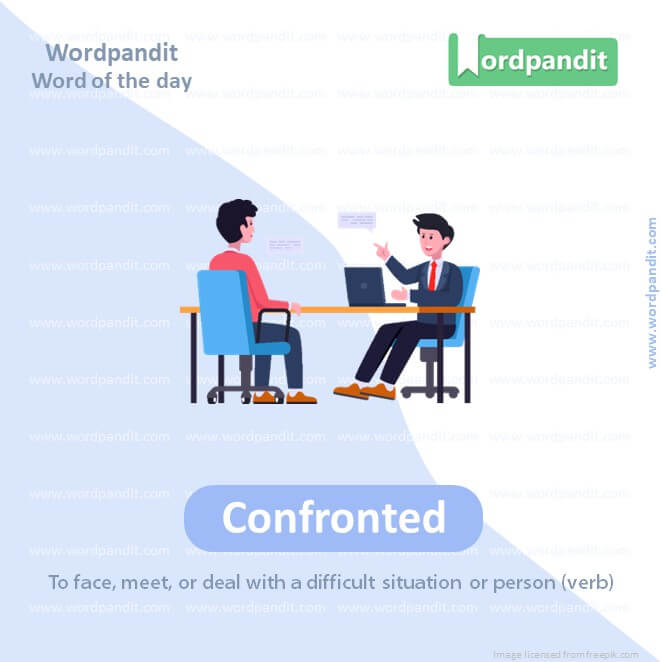
WORD-1: Confronted
CONTEXT: Every day we are confronted with images of the horrors of war – the ongoing conflict in Gaza and Israel and the devastation in Ukraine. Then there are the myriad other conflicts around the world, including in Myanmar, Afghanistan, Yemen and Syria.
SOURCE: The Guardian
EXPLANATORY PARAGRAPH: When you are confronted, it’s like someone or something is standing right in front of you, asking for your attention or challenging you. It can be a person who wants to talk about something important or a problem that you have to solve.
MEANING: To face, meet, or deal with a difficult situation or person (verb).
PRONUNCIATION: kuhn-fruhn-tid
SYNONYMS: Faced, Encountered, Challenged, Opposed, Defied
USAGE EXAMPLES:
1. She confronted her fears of heights by climbing a tall ladder.
2. The team was confronted with a tough challenge during the game.
3. He confronted the bully at school bravely.
4. They were confronted with a difficult decision about their trip.
WORD-2: Myriad
CONTEXT: Every day we are confronted with images of the horrors of war – the ongoing conflict in Gaza and Israel and the devastation in Ukraine. Then there are the myriad other conflicts around the world, including in Myanmar, Afghanistan, Yemen and Syria.
SOURCE: The Guardian
EXPLANATORY PARAGRAPH: Myriad means a very, very big number of things. It’s like if you looked at the stars in the sky and saw so many that you couldn’t count them all.
MEANING: A countless or extremely great number (noun); numerous and varied (adjective).
PRONUNCIATION: meer-ee-uhd
SYNONYMS: Countless, Innumerable, Many, Multitude, Legion
USAGE EXAMPLES:
1. She had a myriad of ideas for her science project.
2. The beach was full of myriad colorful shells.
3. Myriad stars twinkled in the night sky.
4. He faced myriad challenges during his journey.
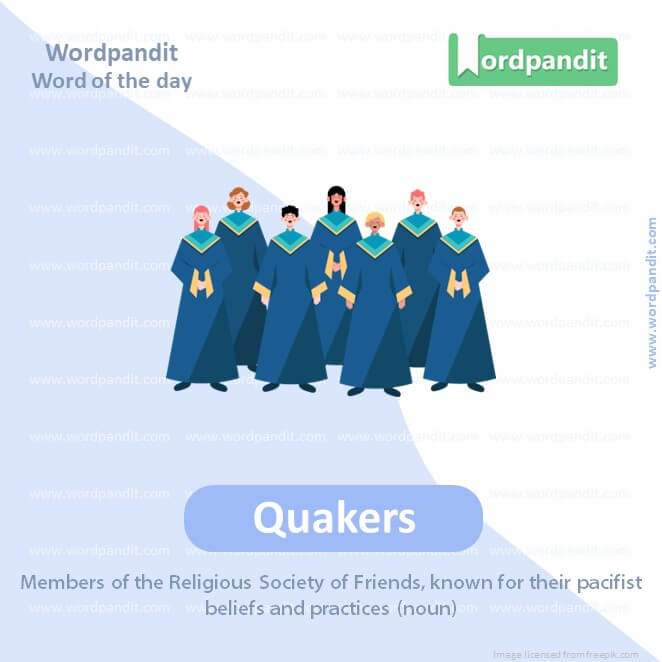
WORD-3: Quakers
CONTEXT: These are matters that concern any engaged world citizen. But they are of particular concern to members of the Religious Society of Friends, better known as Quakers. Quakers arose out of the chaos in the mid-17th century – a “world turned upside down” – as a result of the English civil war.
SOURCE: The Guardian
EXPLANATORY PARAGRAPH: Quakers are people who belong to a group with a special way of practicing their religion. They believe in being peaceful, quiet, and kind to everyone.
MEANING: Members of the Religious Society of Friends, known for their pacifist beliefs and practices (noun).
PRONUNCIATION: kway-kurz
SYNONYMS: Friends, Pacifists, Nonviolent, Religious Group, Spiritual Community
USAGE EXAMPLES:
1. The Quakers held a meeting in their hall.
2. Quakers believe in helping people peacefully.
3. She learned about the Quakers in history class.
4. Quakers have a unique way of worshiping.
WORD-4: Chaos
CONTEXT: As a different kind of chaos turns the world upside down today, how can the Quaker philosophy guide us towards peace? I have been a Quaker for almost half a century and it has taught me many lessons about promoting peace at home and abroad.
SOURCE: The Guardian
EXPLANATORY PARAGRAPH: Chaos is when everything is messy and confusing, like when toys are scattered all over the room, and you can’t find anything.
MEANING: Complete disorder and confusion (noun).
PRONUNCIATION: kay-os
SYNONYMS: Disorder, Confusion, Turmoil, Tumult, Pandemonium
USAGE EXAMPLES:
1. The room was in chaos after the party.
2. The sudden rain caused chaos in the streets.
3. There was chaos in the store during the sale.
4. The game ended in chaos with everyone shouting.
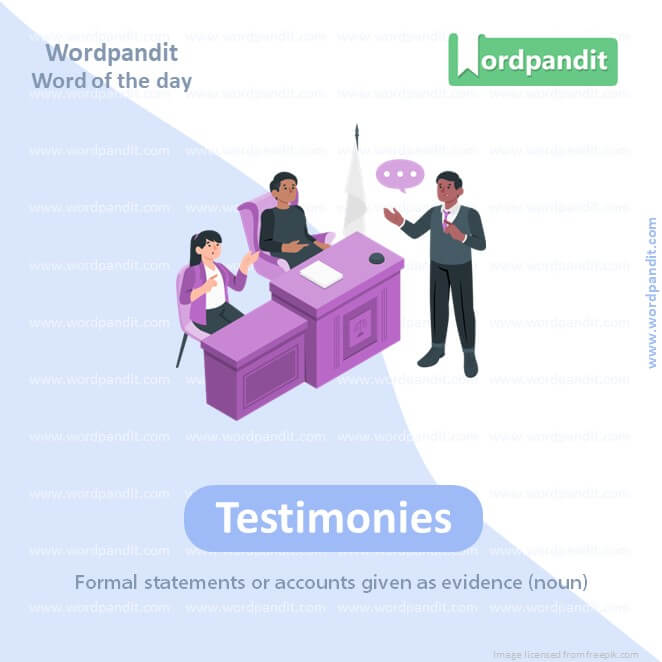
WORD-5: Testimonies
CONTEXT: Quakers seek to live their lives by six social testimonies – peace, simplicity, integrity, community, equality and care of the Earth. The word “testimony” comes from that of “bearing witness”. The testimonies do not have the status of a creed, but are profound matters for individual discernment.
SOURCE: The Guardian
EXPLANATORY PARAGRAPH: Testimonies are like stories people tell about what they saw or what happened to them, especially in important situations like in a courtroom.
MEANING: Formal statements or accounts given as evidence (noun).
PRONUNCIATION: tes-tuh-moh-neez
SYNONYMS: Evidence, Statements, Declarations, Affidavits, Accounts
USAGE EXAMPLES:
1. The judge listened to the testimonies of the witnesses.
2. Her testimony was important for the trial.
3. He gave his testimony about the event he witnessed.
4. The testimonies in the book were inspiring.
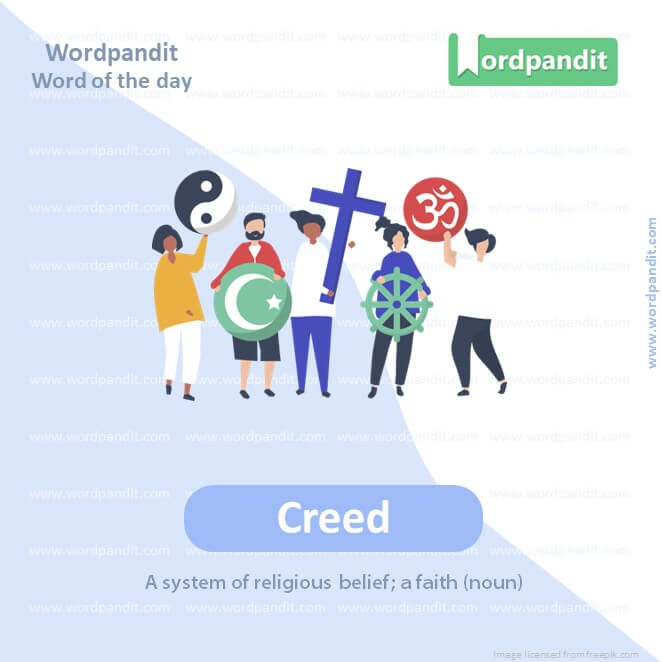
WORD-6: Creed
CONTEXT: Quakers seek to live their lives by six social testimonies – peace, simplicity, integrity, community, equality and care of the Earth. The word “testimony” comes from that of “bearing witness”. The testimonies do not have the status of a creed, but are profound matters for individual discernment.
SOURCE: The Guardian
EXPLANATORY PARAGRAPH: A creed is like a promise or a set of beliefs that people follow, like believing in being kind to others or helping those in need.
MEANING: A system of religious belief; a faith (noun).
PRONUNCIATION: kreed
SYNONYMS: Belief, Faith, Doctrine, Philosophy, Conviction
USAGE EXAMPLES:
1. They recited their creed at the beginning of the service.
2. The creed included principles of kindness and charity.
3. His personal creed motivated him to help others.
4. The organization was founded on a simple creed.
WORD-7: Profound
CONTEXT: Quakers seek to live their lives by six social testimonies – peace, simplicity, integrity, community, equality and care of the Earth. The word “testimony” comes from that of “bearing witness”. The testimonies do not have the status of a creed, but are profound matters for individual discernment.
SOURCE: The Guardian
EXPLANATORY PARAGRAPH: Profound means something is very deep or really important, like a thought that makes you think hard or a feeling that is very strong.
MEANING: Very great or intense; having deep insight or understanding (adjective).
PRONUNCIATION: pruh-found
SYNONYMS: Deep, Meaningful, Intense, Insightful, Thoughtful
USAGE EXAMPLES:
1. She had a profound respect for nature.
2. The book had a profound impact on his life.
3. His words were profound and moving.
4. The experience had a profound effect on her.
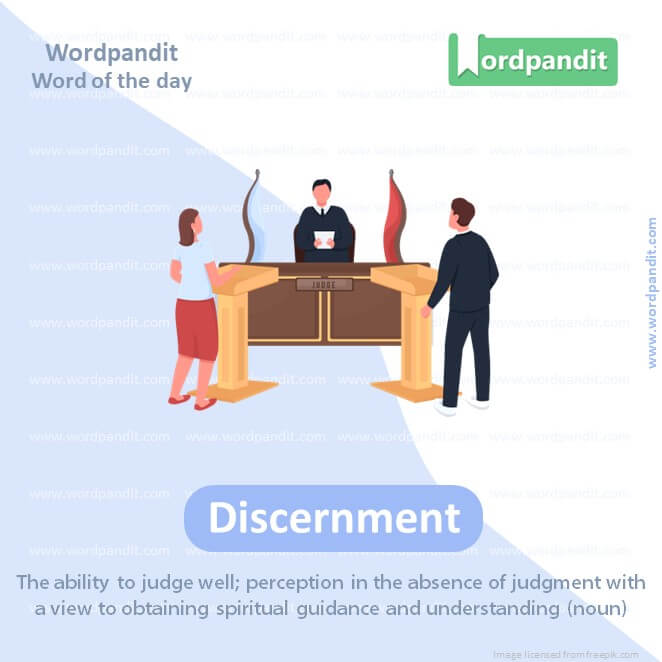
WORD-8: Discernment
CONTEXT: Quakers seek to live their lives by six social testimonies – peace, simplicity, integrity, community, equality and care of the Earth. The word “testimony” comes from that of “bearing witness”. The testimonies do not have the status of a creed, but are profound matters for individual discernment.
SOURCE: The Guardian
EXPLANATORY PARAGRAPH: Discernment is like being a detective, where you look closely at things to understand what is really true or important.
MEANING: The ability to judge well; perception in the absence of judgment with a view to obtaining spiritual guidance and understanding (noun).
PRONUNCIATION: dih-surn-muhnt
SYNONYMS: Judgment, Perception, Insight, Understanding, Wisdom
USAGE EXAMPLES:
1. Her discernment helped her make a good decision.
2. He showed great discernment in choosing his friends.
3. Discernment is important when reading complicated stories.
4. The teacher praised her student’s discernment.
WORD-9: Proclamation
CONTEXT: The peace testimony was set out in a proclamation to King Charles II in 1660. It declares: “We utterly deny all outward wars and strife and fighting with outward weapons for any end or under any pretence whatever”.
SOURCE: The Guardian
EXPLANATORY PARAGRAPH: A proclamation is like a big announcement that someone makes so that everyone can hear important news or information.
MEANING: A public or official announcement, especially one dealing with a matter of great importance (noun).
PRONUNCIATION: prok-luh-mey-shuhn
SYNONYMS: Announcement, Declaration, Edict, Statement, Pronouncement
USAGE EXAMPLES:
1. The mayor made a proclamation about the new law.
2. The proclamation was read aloud to the crowd.
3. The king’s proclamation was about the holiday.
4. She heard the proclamation on the news.
WORD-10: Strife
CONTEXT: The peace testimony was set out in a proclamation to King Charles II in 1660. It declares: “We utterly deny all outward wars and strife and fighting with outward weapons for any end or under any pretence whatever”.
SOURCE: The Guardian
EXPLANATORY PARAGRAPH: Strife is when people are upset or angry with each other and argue a lot, like when you and your friend can’t agree on a game to play.
MEANING: Angry or bitter disagreement over fundamental issues; conflict (noun).
PRONUNCIATION: stryfe
SYNONYMS: Conflict, Struggle, Disagreement, Discord, Contention
USAGE EXAMPLES:
1. The strife between the two groups was evident.
2. He wanted to avoid any strife at the meeting.
3. The story was about the strife in the family.
4. There was much strife in the community over the issue.
Vocabulary Today
In the dynamically evolving spectrum of language, staying updated with ‘vocabulary today’ is an integral part of mastering a language. These topical, contemporary words breathe vitality into our communication, bridging the gap between language learning and language living. But, how can we effectively learn ‘vocabulary today’?
Grasping ‘vocabulary today’ begins with exposure to contemporary contents. Engaging with current publications, social media platforms, movies, music, podcasts, and digital content can dive you into the real-world usage of ‘vocabulary today’. These platforms imbibe the vocabulary of the day, reflecting the evolution in language.
To consolidate the learning of ‘vocabulary today’, utilize memory-enhancing tools. Flashcards, language learning apps, or memory-enhancement software can make your study session an engaging venture and enhance word retention.
However, the secret sauce to learning ‘vocabulary today’ is practice. Inculcating these words in your regular dialogues, written correspondences, or social media posts will reinforce your grasp over these words. It brings you closer to ‘vocabulary today’, enhancing your language adaptability and fluency.
Better understanding of ‘vocabulary today’ can be achieved by staying connected with diverse social platforms which bring words from across locations and cultures, expanding your linguistic understanding. Also, participating in language forums, discussion groups, or language exchange platforms provides great insights into ‘vocabulary today’.
In the final analysis, staying abreast with ‘vocabulary today’ is an exciting quest that requires consistent exposure, active practice, and social engagement. As you embrace this journey, you will find your language proficiency growing with every new word, enabling you to step into the dynamic world of contemporary language with confidence and mastery. Remember, ‘vocabulary today’ is not static, it flows like a river, always fresh, always changing, and always enriching!













